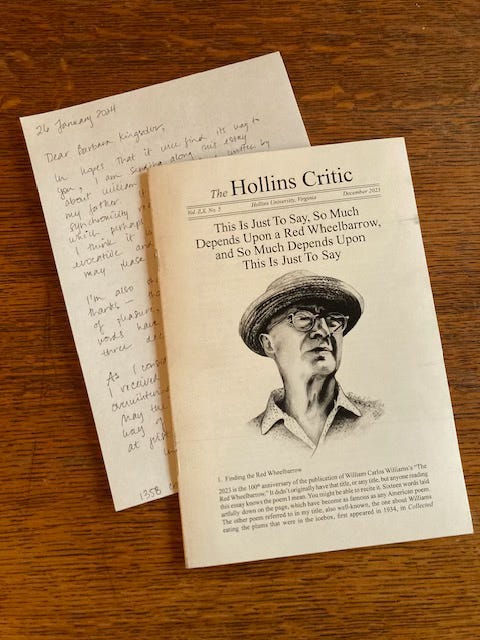If forced to choose, I would say that Barbara Kingsolver is my favorite writer. I’ve read all her books, most more than once, and am always inspired, elevated, and educated by the experience. However, although I’ve been reading her for three decades, I’ve never written her a letter. Until now.
I had a frisson of excitement as I handed the envelope over to the clerk at the post office. The letter was constructed with care - I’d written a rough draft, and then copied it onto a piece of cotton paper I save for special communications. My thoughts tend to tumble out on the page, making my handwriting difficult to read, so I had to take a deep breath and move my pen slowly across the page. Included in the 9x12 manilla envelope was the reason for it all - an essay written by my father that mentioned The Poisonwood Bible, and a bit of synchrony; I thought she might enjoy it, and I very much wanted her to read it.
I made all my best efforts. My initial impulse led me to her website, where I read, “Barbara loves reading letters from readers. Fan mail has given her a long list of reasons to keep writing books,” giving me a reason to believe that my mail might be welcome, not an intrusion. I composed carefully and wrote neatly, double-checked the address, sealed the package well.
So, the envelope is making its way to Virginia via the United States Post Office, an institution I dearly wish to still be able to love. I hope it will get to her PO Box, and that her office assistant will decide to open it, and pass it on to her. But all of these things are out of my control.
Herein lies the trouble. And it has nothing to do with the recent self-destructive tendencies of the USPS, or the whims of Ms. Kingsolver’s assistant. The problem is that I am attached to the outcome. I will reiterate - I very much want her to read the essay.
Action is fueled by desire. We act because we want something. Generally speaking, we get satisfaction (or not) from our actions based on the response we receive… which plants the seed of the next desire - and essentially we are never satisfied. In the Bhagavad Gita, Krishna, our teacher, says: “Those who are motivated only by desire for the fruit of action are miserable, for they are constantly anxious about the results of what they do” (BG 2:49) and “You have the right to work, but never to the fruit of work. You should never engage in action for the sake of reward…” (BG 2:47).
As I sat reading my father’s essay the first time, I was simply enjoying it - until The Poisonwood Bible got into the mix. Then I suddenly wanted something. I wanted Barbara Kingsolver to read it - I thought she would get a kick out of this creative tribute to William Carlos Williams, and appreciate the synchrony of her book’s well-timed relevancy to my father’s research. I also knew my father spent several months crafting the piece, and to have her read it would mean a lot to him.
The desires that prompted my action were not selfish, not ego-driven, but based in affection for the two other people involved. Which is a good place to begin, yogically speaking. It’s what the Sutras call a “white” karma (YS 4.7). However, since I care about the outcome, I am setting myself up for suffering. The mail may not reach her, it may not be directed to her attention, she might decide not to read it even if it does. And who knows if she will like it. Not to mention, it is extremely unlikely that I will ever hear anything back from her no matter what she thinks, so I will probably never know the fate of that envelope.
This is why Yoga teaches us that attachment is suffering - even a well-intentioned action like this one can easily lead to disappointment, which is why Krishna says a person is wise, “… when all their undertakings are free from anxiety about results…” (BG 4:19). Because I understand this truth at least a little bit, I have been tuned into my attachment to the outcome, and have been practicing letting it go throughout the process, even before I actually wrote the letter. I expect this will be helpful.
After typing the last paragraph, I walked into the kitchen to make dinner. While I cook I often listen to a book - currently The Creative Act, by Rick Rubin. When I pushed play, these are the very first words I heard: “We attempt them without expectation regarding outcome.” Them, creative works. Actions. Clearly not an original thought, but one worth repeating a thousand, thousand times, and a timely affirmation that I’m on the right track.
Make your finest effort. Then be content. Release your attachment to the outcome. Control causes pain. After doing your best, the fruit of surrender is peace.





Insightful, helpful and beautiful essay. I hope I can remember to put its teachings into practice. Reminded me of something my husband learned and shared with me almost 50 years ago about the inherent joy of giving Xmas presents without signing our names, and the sweet feeling we had leaving anonymous wrapped gifts on the steps of homes of children he taught in Head Start.